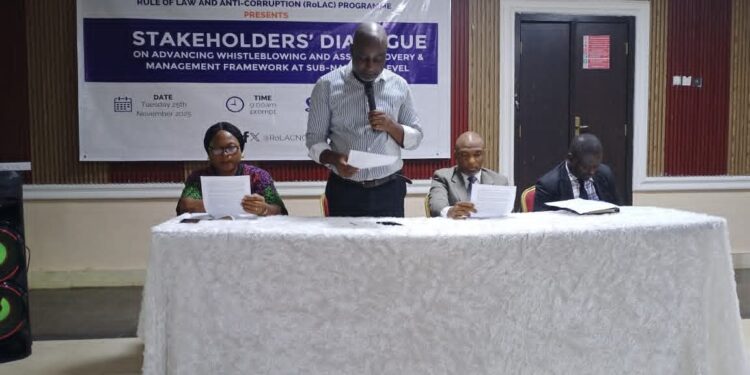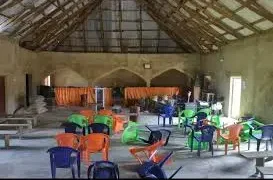Stakeholders have supported the stepping down of the whistle blowing and asset recovery and management framework to strengthen Anti-corruption reforms in Edo State.
The stakeholders made up of Civil Society Organisations, CSO’s government officials, Anti-corruption agencies, the media and the academia advocated the sustainability of the whistleblower and Asset Recovery and Management Framework in Edo State during a dialogue session organized by the Africa Network for Environment and Economic Justice (ANEEJ) as part of the implementation of the Civil Society Advocacy to Strengthen Anti-corruption Reforms in Nigeria (CASARN) project.
The Executive Director of ANEEJ, Rev. David Ugolor who was represented by Mr. Innocent Edemhanria, disclosed that since the introduction of the Whistleblower Policy and the Asset Recovery and Management Framework by the Federal government, Nigeria has made meaningful progress in exposing corruption, recovering stolen assets, and strengthening public trust in accountability mechanisms.
“The establishment of the Asset Recovery and Management unit at the Federal Ministry of Justice and the enactment of the Proceeds of Crime ( Recovery and Management) Act (POCA) 2022 are significant steps that have improved the coordination and legal clarity around asset recovery.
“However, as we all know, these gains remain fragile. Implementation gaps, weak institutional protections for whistleblowers, limited awareness among citizens, and the absence of harmonised structures at state level continue to undermine the full potential of these reforms. Many whistleblowers still fear retaliation, many citizens remain unsure about reporting channels and several institutions lack the capacity or clarity required to manage recovered assets transparently.”
According to Rev. Ugolor, “Edo State has taken important strides in promoting transparency and public financial integrity. Yet, the full benefits of whistleblowing and asset recovery frameworks cannot be realized unless they are deliberately adapted, strengthened, and operationalized at the sub-national level.
” States are closest to the people; states manage procurement, budgeting, service delivery, and Frontline governance. Therefore, if whistleblowing must work for ordinary citizens, it must work at the state level. And if asset recovery must produce real development outcomes, then state institutions must have the capacity and systems to manage recovered assets responsibly.
“Today’s dialogue brings together the right actors from government officials, Anti-corruption agencies, civil society, the media, and the academia to reflect critically on what has been achieved, identify the barriers that persist, and chart practical strategies for making whistleblowing and asset recovery truly functional in Edo State.”
While expressing appreciation to the Edo State government, the ICPC, EFCC, Federal Ministry of Justice, Civil Society Organisations and the media and all stakeholders, Rev Ugolor noted that their participation demonstrates a shared commitment to deepening transparency and improving governance in Edo State.
” The CASARN project is a one year project implemented under the Rule of Law and Anti-Corruption (RoLAC 11) project. The RoLAC 11 project is being implemented by the International Institute for Democracy and Electoral Assistance ( International IDEA) with funding support from the European Union,
“We are grateful to RoLAC team, the International Institute for Democracy and Electoral Assistance ( International IDEA) and the European Union for the opportunity to implement this project,” he added
The stakeholders after reviewing the current national framework and what it means for state level adaptation urged Governor Monday Okpebholo of Edo State to adopt the policy leveling the existing Anti-Cultism laws in the state.









